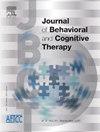跆拳道正念动作干预辩证行为疗法的可接受性与可行性
IF 1.6
Q3 PSYCHIATRY
引用次数: 0
摘要
边缘型人格障碍(BPD)通常与饮食行为紊乱并存。这一复杂人群迫切需要有效的治疗方法。正念运动干预可能是一种有希望的辅助性治疗选择,对于有BPD症状的个体,特别是那些同时发生饮食失调的个体。先前的研究表明,跆拳道是一种强调身心联系的韩国武术,是一种可接受且可行的候选干预手段。本初步研究(N = 24,女性79.2%,Mage = 31.2;75.0%白人)使用受试者内设计检验了跆拳道和正念干预在辩证行为治疗(DBT)强化门诊项目(IOP)中的可接受性和可行性。患者对跆拳道组的平均满意度和有效性均给予较高评价(3.6-4.7/5),焦虑水平也有显著改善(p = 0.001)。d = 0.76),悲伤(p = 0.002, d = 0.74),幸福(p & lt;0.001, d = - 0.86),松弛(p <;0.001, d = - 0.96)。相反,在对照组(传统正念)中,悲伤(p = 0.082, d = 0.40)和快乐(p = 0.078, d = - 0.41)没有显著变化。在跆拳道组之后,暴食频率与悲伤程度的显著降低相关(r = 0.43, p = 0.041),但与对照组无关(r = 0.01, p = 0.977)。与未排毒的患者相比,排毒患者在跆拳道组后的幸福感增加更大(p = 0.024, d = 1.23),但在对照组后的幸福感增加较小(p = 0.037, d = - 1.24)。总之,初步的研究结果表明,跆拳道作为一种辅助治疗的正念运动有附加的好处。本文章由计算机程序翻译,如有差异,请以英文原文为准。
Acceptability and feasibility of a Taekwondo mindful movement intervention in Dialectical Behavior Therapy
Borderline personality disorder (BPD) is often comorbid with disordered eating behaviors. Effective treatments are critically needed for this complex population. Mindful movement interventions may represent a promising, adjunctive treatment option for individuals with BPD symptoms, especially those with co-occurring disordered eating. Previous work has demonstrated that Taekwondo, a Korean martial art emphasizing mind–body connections, is an acceptable and feasible candidate intervention. This pilot study (N = 24, 79.2% female, Mage = 31.2; 75.0% white) examined acceptability and feasibility of a Taekwondo and Mindfulness intervention in a Dialectical Behavior Therapy (DBT) intensive outpatient program (IOP) using a within-subjects design. Patients consistently rated Taekwondo groups highly regarding average satisfaction and effectiveness (3.6–4.7/5), and showed significant state-level improvements in anxiety (p = 0.001. d = 0.76), sadness (p = 0.002, d = 0.74), happiness (p < 0.001, d = −0.86), and relaxation (p < 0.001, d = −0.96) following group participation. Conversely, significant changes in sadness (p = 0.082, d = 0.40) and happiness (p = 0.078, d = −0.41) were not observed following Comparison Groups (Traditional Mindfulness). Binge-eating frequency was correlated with greater reductions in sadness (r = 0.43, p = 0.041) following Taekwondo groups, but not Comparison Groups (r = 0.01, p = 0.977). Compared to non-purging individuals, patients reporting purging showed greater increases in happiness following Taekwondo groups (p = 0.024, d = 1.23), but smaller increases following Comparison Groups (p = 0.037, d = −1.24). Together, preliminary findings suggest an additive benefit of Taekwondo as a mindful movement adjunct to treatment.
求助全文
通过发布文献求助,成功后即可免费获取论文全文。
去求助
来源期刊

Journal of Behavioral and Cognitive Therapy
Psychology-Clinical Psychology
CiteScore
3.30
自引率
0.00%
发文量
38
审稿时长
60 days
 求助内容:
求助内容: 应助结果提醒方式:
应助结果提醒方式:


